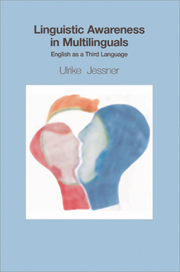Book contents
- Frontmatter
- Contents
- List of figures and tables
- List of abbreviations
- Acknowledgements
- Introductory remarks
- 1 Multilingualism with English
- 2 Learning and using a third language
- 3 On the nature of linguistic awareness
- 4 Exploring linguistic awareness in third language use
- 5 Crystallizing linguistic awareness in multilingual education
- 6 Envoi
- References
- Index
5 - Crystallizing linguistic awareness in multilingual education
Published online by Cambridge University Press: 05 September 2013
- Frontmatter
- Contents
- List of figures and tables
- List of abbreviations
- Acknowledgements
- Introductory remarks
- 1 Multilingualism with English
- 2 Learning and using a third language
- 3 On the nature of linguistic awareness
- 4 Exploring linguistic awareness in third language use
- 5 Crystallizing linguistic awareness in multilingual education
- 6 Envoi
- References
- Index
Summary
In this chapter various applications of research on linguistic awareness to multilingual education will be presented. It is suggested that one of the main goals in future language teaching should be to foster linguistic awareness, one of the key factors of multilingual proficiency, in the classroom. How synergies and new qualities in language learning can be created in both multilingual learners and teachers respectively will be the focus of the main part of the discussion. In relation to this, some recent European projects on multilingual learning and teaching will be presented. Since English language teaching forms part of more or less every syllabus, this new approach not only represents one important step in the development of multilingual education in general but also has implications for the English language classroom.
MULTILINGUAL SCHOOLING
For many children all over the world learning a third language at school is a common experience. There are specific multilingual schools in which several languages are used as languages of instruction such as the European schools (e.g. Baetens-Beardsmore 1995) or double immersion in Canada (e.g. Genesee 1998), but it is much more common to study two foreign languages as school subjects. So TLA in the school context and trilingual education are not new phenomena but are becoming more widespread. This development is related to the trend to introduce a foreign language at an earlier age and a second foreign language in secondary school and the increasing use of minority languages in education in many parts of the world (e.g. Cenoz et al. 2001c).
- Type
- Chapter
- Information
- Linguistic Awareness in MultilingualsEnglish as a Third Language, pp. 120 - 139Publisher: Edinburgh University PressPrint publication year: 2006



